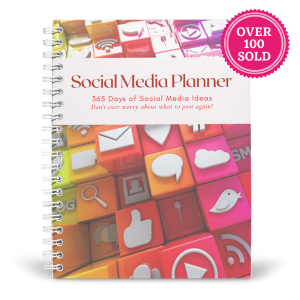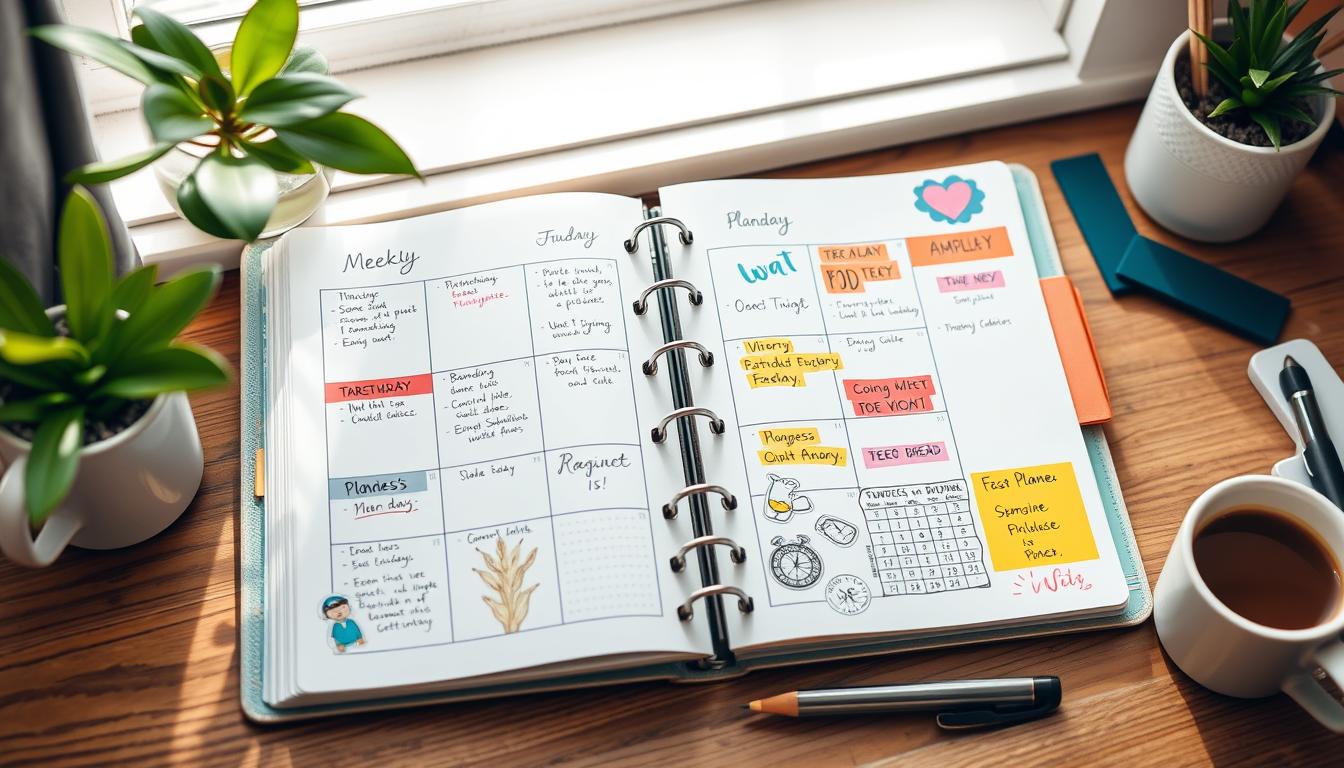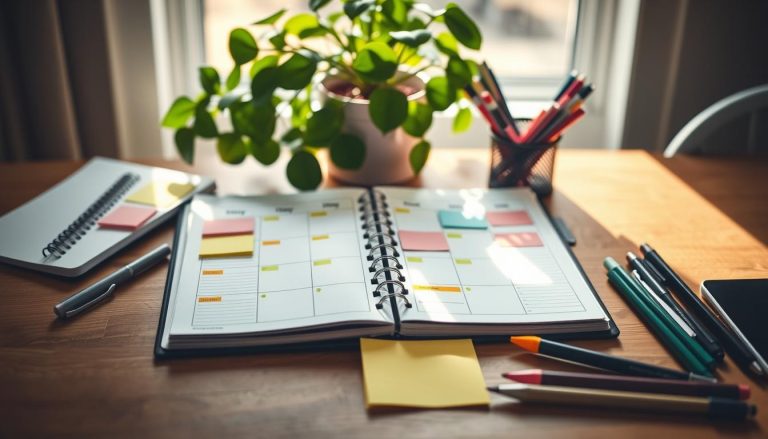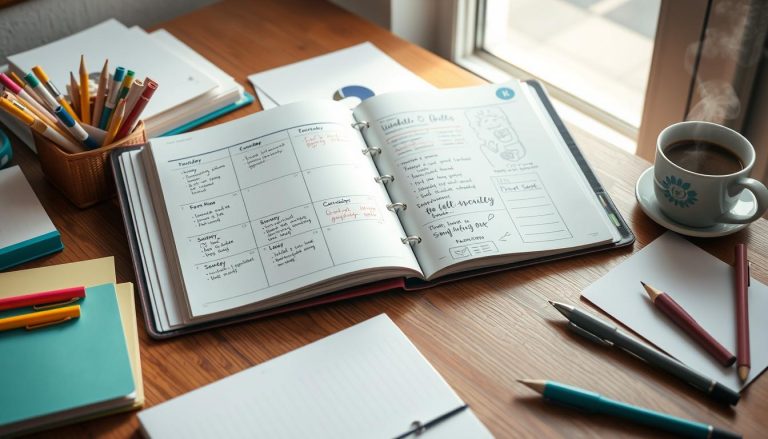A Beginner’s Guide to Using a Weekly Planner for Goal Setting and Time Management
In today’s fast world, managing time and reaching goals can be tough. But, using a weekly planner can change everything. It can make you more productive and successful. This guide will show you how weekly planning can improve your time management, goal setting, and organization.
Key Takeaways
- Discover the benefits of structured time management through weekly planning
- Understand how weekly planning differs from daily or monthly approaches
- Learn the psychology behind successful planning and goal setting
- Explore essential features of an effective weekly planner
- Get started with your own weekly planner setup and first-time planning
- Utilize smart goal-setting techniques to maximize your weekly planner
- Boost your productivity and achieve your personal and professional goals
Understanding the Power of Weekly Planning for Personal Success
Weekly planning is key to managing time well and reaching your goals. It offers benefits that daily or monthly plans can’t match. By planning your week, you unlock personal and professional gains.
Benefits of Structured Time Management
Weekly planning brings many advantages for success. It helps you organize tasks and priorities in a week. This way, you:
- See your duties clearly, making time use more efficient.
- Spot and solve problems before they slow you down.
- Feel more focused and in control, lowering stress and boosting productivity.
- Balance work and life better, meeting both personal and professional needs.
How Weekly Planning Differs from Daily or Monthly Planning
Weekly planning stands out from daily and monthly methods. It gives a wider view than daily plans, helping you make strategic choices. Unlike monthly plans, which can feel far away, weekly plans keep you in the present while looking ahead.
The Psychology Behind Successful Planning
Planning is more than just organizing; it’s about understanding human behavior. Weekly planning helps you form habits, use visual reminders, and track progress. These elements boost motivation and success.
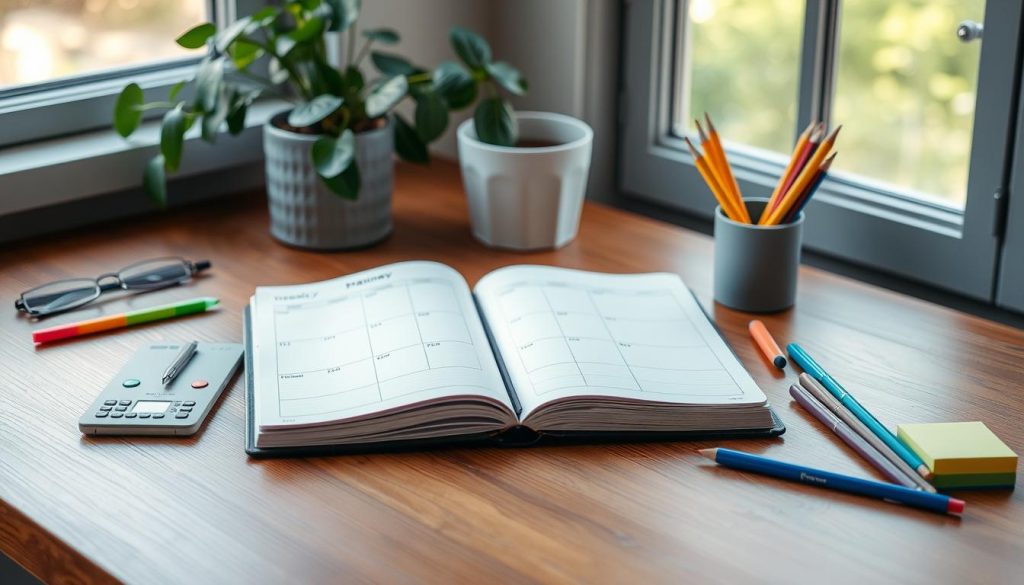
Embracing weekly planning can change your life. It boosts productivity, focus, and fulfillment. By using this method, you can achieve more in your personal and professional life.
Essential Features of an Effective Weekly Planner
Choosing the right planner features is crucial for planning your week. A good weekly planner should have tools to keep you organized and productive. Let’s look at key features that can improve your weekly planning experience.
A top feature is setting and tracking your goals. Look for a planner with sections for weekly, monthly, or yearly goals. This keeps you focused and motivated towards your goals.
A to-do list or priority list is also essential. It lets you list and prioritize tasks for each day or week. This way, you focus on the most important tasks first.
Time-blocking is another great feature. It’s supported by a good weekly planner layout. Find a planner that lets you schedule specific times for tasks, meetings, or personal activities. This boosts your productivity and prevents over-scheduling.
Lastly, consider a planner with space for notes, journal entries, or habit tracking. These features add to your planning experience. They give a full view of your progress and growth.
When picking a weekly planner, choose one that fits your style. Look at different options and pick a planner layout that keeps you organized and on track.
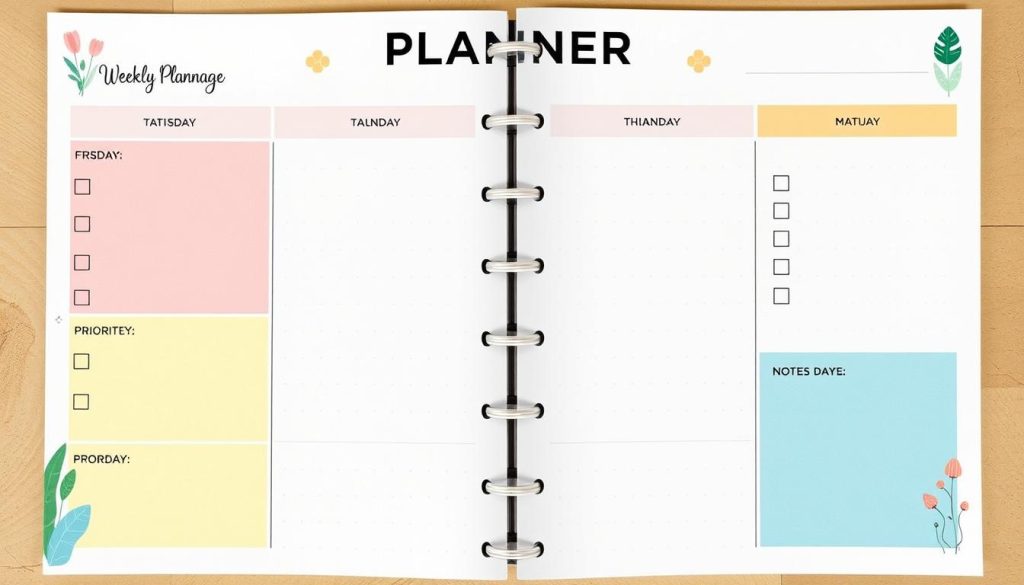
“A well-designed weekly planner can be a game-changer in your pursuit of personal and professional success.”
Getting Started with Your Weekly Planner: Basic Setup
Starting your weekly planning journey is exciting. It’s a step towards being more productive and successful. You’ll need to find a planning style and set up your weekly layout that fits you. Then, you’ll make your first weekly schedule to use your new skills.
Choosing Your Planning Style
There’s no single way to set up your planner. The goal is to pick a planning style that feels right to you. Here are a few popular ones:
- Minimalist: It’s simple and focuses on the basics.
- Detailed: It has lots of room for notes and tracking tasks.
- Visual: It uses icons, colors, and doodles to make planning fun.
Setting Up Your Weekly Layout
After picking your planning style, it’s time to set up your weekly layout. This is where you plan out your days and schedule activities. You might want to include:
- Daily schedules with time slots
- Spaces for to-do lists, notes, and reminders
- Areas for tracking goals, habits, and progress
Creating Your First Weekly Schedule
Now that your weekly layout is set, it’s time to make your first schedule. Start by listing your must-do tasks, like work or school. Then, add time for your important tasks and hobbies. Don’t forget to leave space for flexibility and self-care. Always check and adjust your weekly schedule to keep a good balance between work and life.
“The key to successful time management is not doing more in less time, but rather doing the right things in the time you have.”
Smart Goal Setting Techniques Using Your Weekly Planner
Using your weekly planner to set SMART goals is a great start. SMART means Specific, Measurable, Achievable, Relevant, and Time-bound. This helps you create a clear path to success and track your progress.
Start by thinking about your big dreams, like career goals or personal growth. Then, break these down into smaller tasks in your planner. This makes your goals feel reachable and lets you celebrate your wins.
Your planner is also key for planning your achievements. Set aside time for important tasks and use reminders to stay on track. Regularly check your progress and adjust your plans as needed. This keeps your planning in sync with your changing goals and priorities.
FAQ
What is the purpose of a weekly planner?
How does a weekly planner differ from daily or monthly planning?
What are the key features of an effective weekly planner?
How do I choose the right weekly planner for my needs?
How do I set up my weekly planner for the first time?
How can I use my weekly planner for effective goal-setting?
-
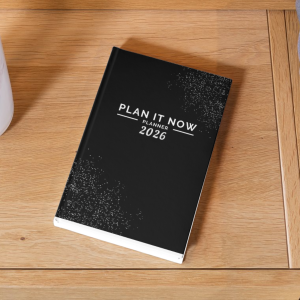 Product on salePlan It Now Planner 2026Original price was: £19.99.£16.99Current price is: £16.99.
Product on salePlan It Now Planner 2026Original price was: £19.99.£16.99Current price is: £16.99. -
 Product on saleThe Network Marketer’s Planner 2026Original price was: £19.99.£16.99Current price is: £16.99.
Product on saleThe Network Marketer’s Planner 2026Original price was: £19.99.£16.99Current price is: £16.99. -
